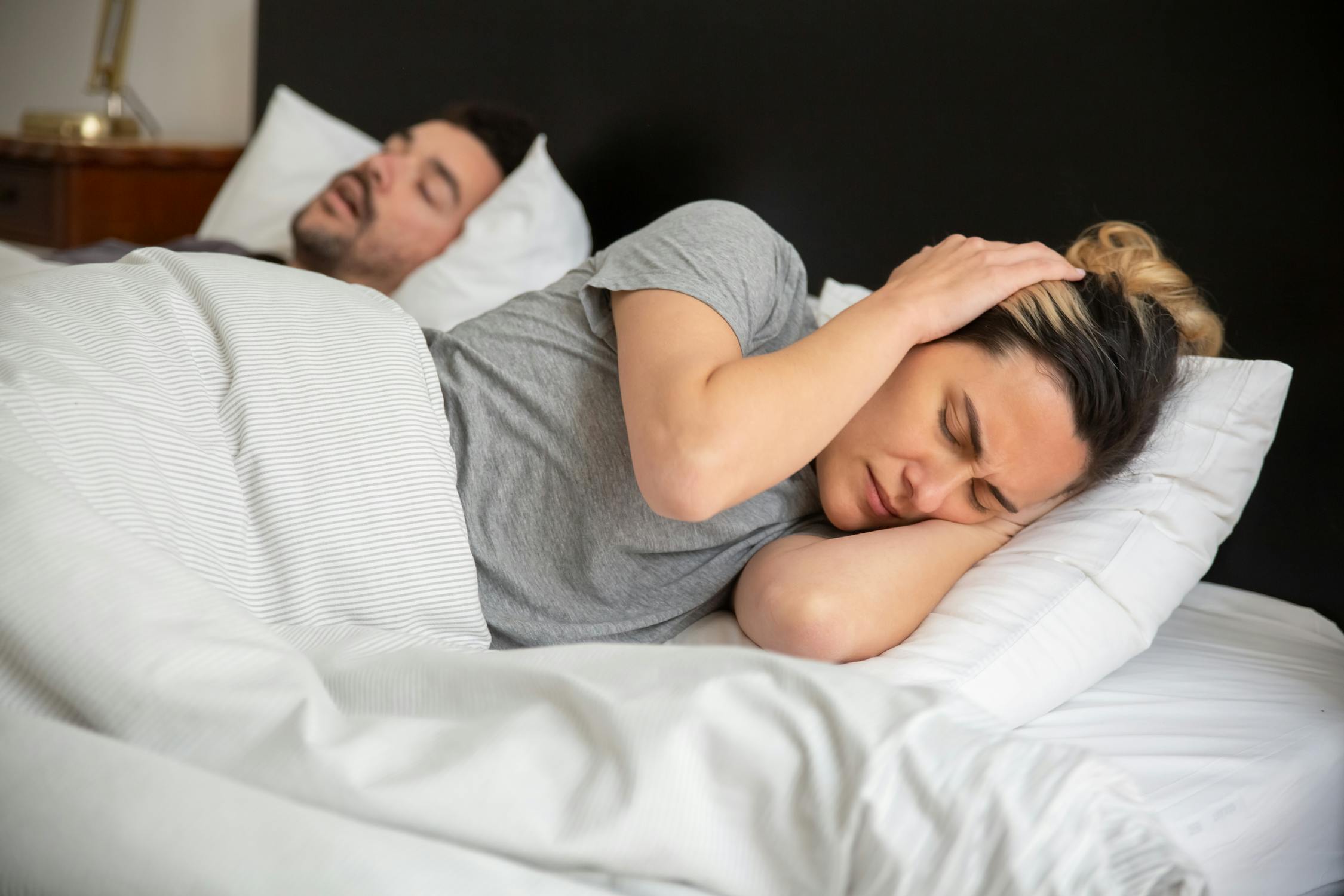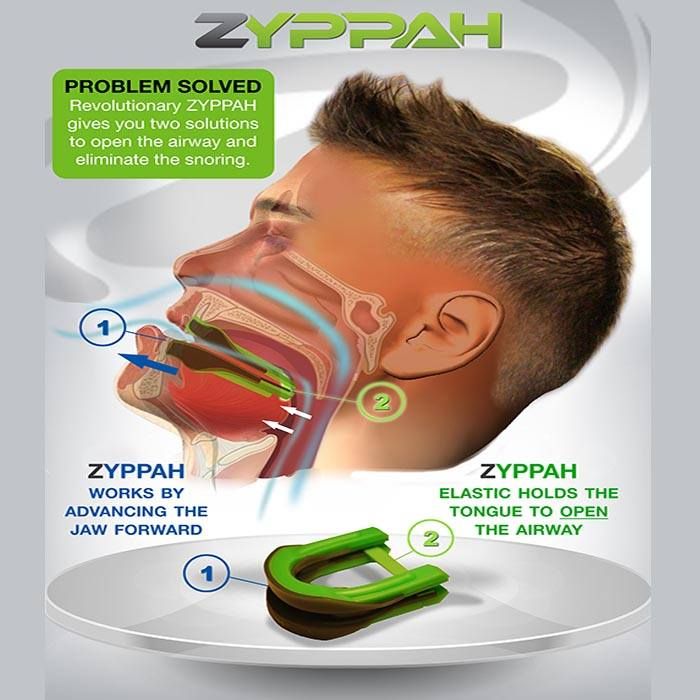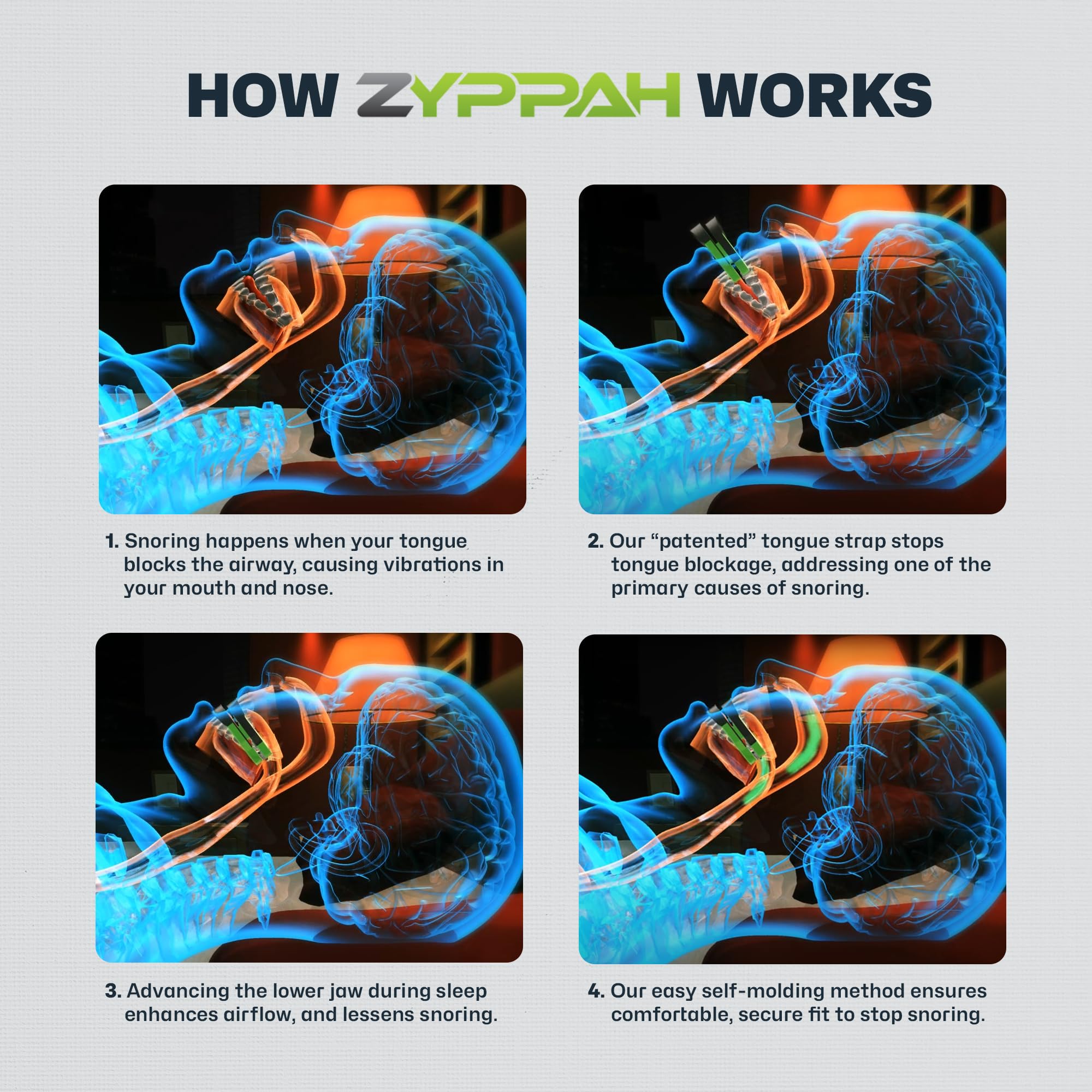The Silent Night Revolution: How Zyppah is Changing the Snoring Game
Feb 28th 2024
Snoring affects over 90 million Americans and disrupts the sleep quality of snorers and those around them.
This nuisance, characterized by loud breathing sounds during sleep, can stem from various factors, including the mouth's anatomy, sinuses, allergies, obesity, and sleep posture. The tongue, however, is the primary factor in most snoring.
The quest for a peaceful night's sleep has led many to explore various remedies, with mouthguards emerging as a popular solution.
Mouthguards, designed to reduce snoring by maintaining an open airway, are commonly sought after. They work by adjusting the jaw or tongue position for easier breathing. However, the effectiveness of these devices is a subject of debate.
While some users report significant improvements, others find minimal to no change in snoring patterns. The challenge with standard mouthguards lies in their one-size-fits-all approach.
Innovative solutions like Zyppah emerged in response to the shortcomings of traditional mouthguards. Zyppah has a 91% success rate and differs from the conventional options because it adopts a unique approach to tackling snoring.
In this article, we will dive deeper into why most stop-snoring mouthguards fail to deliver and how Zyppah's technology effectively addresses the core issue of snoring, the tongue, offering a more promising solution for those seeking a peaceful night's sleep.
Understanding Snoring: It's Primarily About the Tongue!
A study published in the Journal of Sleep Research indicates that factors such as body weight, age, sleep posture, and the tongue's position significantly influence snoring, aspects that jaw advancement cannot address.
Expert opinions and multiple studies in sleep medicine also highlight the multifaceted nature of snoring. (add external link - https://www.ncbi.nlm.nih.gov/pmc/articles/PMC4389...
Understanding the root cause of snoring is essential in addressing it effectively, and often, as we mentioned earlier, it's not the jaw but the tongue that plays a key role.
When we sleep, our muscles, including those in the tongue and throat, relax. This relaxation causes the tongue to fall back into the airway for many individuals, creating a partial blockage.
As air flows past this obstruction, it causes the relaxed tissues of the throat to vibrate, producing the familiar sound of snoring. This is particularly pronounced during deep sleep phases when muscle relaxation peaks. The severity of this obstruction can vary from person to person, influenced by factors such as muscle tone, sleep posture, and anatomical differences.
Why does your tongue falling back in your throat cause snoring in almost all cases?
In most cases, snoring is linked to Bernoulli's Principle, which explains how fluid dynamics change in constricted spaces.
When the area in a tube narrows, the fluid's speed and pressure increase exponentially. Air, being a fluid, behaves similarly.
Picture a river where it narrows water speeds up, creating turbulence or rapids. Similarly, partially covering a hose's end with your thumb turns a gentle flow into a forceful jet. The noise is louder as the water hits a surface like a garage door.
In this analogy, your nose is the garage door, your thumb is the tongue, and the water is the air you breathe. Though the sound originates from the nose, it's actually caused by the tongue restricting airflow.

Source: Photo by Kampus Production:
For those with a larger tongue or a smaller mouth and throat space, the risk of the tongue causing airway obstruction is even higher. Age also plays a role as muscle tone decreases, including in the tongue, making it more likely to relax and obstruct the airway.
The American Academy of Sleep Medicine suggests that effective treatment for snoring requires a comprehensive understanding of its causes, which vary from person to person. (add this external link to the word American Academy of Sleep Medicine - https://aasm.org/is-it-more-than-a-snore-recogniz...
A common observation is that snoring intensifies when lying on the back, often leading to a nudge from the bed partner to switch to a side position, where snoring noticeably decreases.
This pattern suggests that the root cause of snoring is likely the tongue collapsing while lying on the back. The reduced snoring when on the side indicates that the tongue's position changes, mitigating the snoring.
What about alcohol?
Alcohol consumption tends to either initiate snoring or exacerbate it, which is true.
The reason for this lies in alcohol's properties as a muscle relaxant. Considering that the tongue is a muscle, alcohol's relaxing effect causes it to become more lax.
As a result, gravity pulls the relaxed tongue back into the throat, obstructing the airway and leading to snoring. Simply put, this connection between alcohol consumption and increased snoring is a direct consequence of alcohol's impact on muscle relaxation.
Snoring can be compared to the noise an airplane engine makes. An airplane engine is loud because it accelerates air through its blades, creating turbulence and noise.
Similarly, when the tongue falls back into the throat during sleep, it accelerates the air, resulting in turbulence and snoring noise. To determine if your tongue is the cause of snoring, you can conduct a simple "snore test": if you snore less when sleeping on your side, snore more after consuming alcohol or muscle relaxants, or if your snoring seems to come from your nose but doesn't occur when awake, then the likely cause is your tongue.
The Limitations of Jaw Advancement
The traditional approach of most anti-snoring mouthguards centers on advancing the jaw, which, while logical in theory, falls short in practice.
The technique assumes that snoring predominantly stems from the jaw positioning during sleep, leading to airway obstruction. However, this one-dimensional perspective needs to pay more attention to the complex anatomy and varied causes of snoring, contributing to its limited effectiveness.
Advancing the jaw forward opens the airway to some extent by pulling the tongue and soft tissues forward. However, for many individuals, this isn't enough to alleviate snoring.
Most people believe snoring originates from the nose, but this is rarely true. Consider this: when you sleep, muscles such as the tongue relax, but the structure of the nose remains unchanged.
If the nose were the primary cause of snoring, one would also snore while awake, as the nose's condition remains unchanged. Yet, daytime snoring is uncommon. This observation indicates that the nose is not the primary culprit in causing snoring.
In most cases, the root cause of snoring lies beyond the jaw's position.
Airway Blockage Risks:
Even with jaw adjustment, relaxation of the tongue and soft tissues in the throat can cause significant airway blockage. This is especially true for those whose snoring is due to issues at the base of the tongue or the soft palate.
Need for Customization:
The success of jaw advancement relies heavily on precise, individual alignment. Generic mouthguards often need to provide a proper level of customization, limiting their effectiveness.
Without a tailored fit, these mouthguards may not position the jaw adequately or comfortably, leading to minimal impact on snoring or even discomfort during sleep.
Why Zyppah works - Dual hybrid solution
Zyppah is the only snoring solution to directly address the tongue with its patented "Seatbelt for the Tongue" by not letting your tongue fall backward.
Designed by Dr. Jonathan Greenburg, a bioengineer and dentist renowned for his snoring and sleep treatment expertise, Zyppah offers a unique combination of a mandibular advancement device with a stabilizing band for the tongue.

Our product stands out because of its multiple features, including:
Dual Hybrid Solution:
Zyppah combines jaw advancement and tongue stabilization to tackle the two leading causes of snoring – keeping the airway open and preventing tongue blockage.
Clinically Proven and FDA-Approved:
Backed by an FDA-approved study, Zyppah demonstrates a remarkable 91% success rate in stopping snoring, a level of effectiveness rare in the market.
#1 Doctor-Recommended:
Its proven efficacy makes Zyppah the top choice for an anti-snoring mouthpiece among doctors.
Custom Fit Technology:
Zyppah utilizes boil and bite technology for customizability, ensuring both effectiveness in stopping snoring and comfort for the user without the teeth crowding often associated with standard mouthguards.
Comfort and Effectiveness:
Zyppah's design prioritizes user comfort while maintaining effectiveness, which leads to high customer satisfaction.
Impressive Satisfaction Rate:
A striking 93% of Zyppah users report being happy with the product, highlighting its success meeting customer needs and expectations.
Zyppah's commitment to customer satisfaction extends to its 91-day money-back guarantee, a confident offer that underscores the product's reliability.
Moreover, its 91% success rate positions Zyppah as an undeniably strong contender in the anti-snoring product space.
Its innovative approach to combating snoring is a testament to its blend of scientific backing and practical application.
Comparison with Competitors
Many products are available in anti-snoring solutions, each claiming to relieve the issue.
However, a closer analysis reveals a significant shortcoming in most of them: they need to address the critical role of the tongue in snoring.
Two of them are:
Mouthguards and mandibular advancement devices (MADs)
These standard anti-snoring products typically function by moving the lower jaw forward. It intends to open the airway; however, it does not always prevent the tongue from falling back into the throat, the main cause of snoring for many individuals.
Most over-the-counter mouthguards focus solely on advancing the jaw, assuming this will suit all individuals.
Moreover, the discomfort and inconvenience of using these mouthguards is also a burden. They often require boiling and molding, which can be cumbersome and not consistently effective, leading to ill-fitting devices that are uncomfortable to wear throughout the night. The added difficulty may disrupt sleep, defeating the mouthguard's purpose.
While these devices may provide some level of snoring reduction, their efficacy is limited due to their lack of tongue stabilization.
Nasal strips and sprays
Another popular category of snoring solutions targets the nasal passages. They are effective for snorers whose primary issue is nasal congestion or structural blockages in the nose.
Unfortunately, they are ineffective for snoring from the throat, precisely due to tongue relaxation.
Zyppah
Zyppah's patented Tongue Band is a game-changer in the anti-snoring market. Its unique feature and jaw advancement mechanism offer a dual solution.
While the mouthguard component of Zyppah advances the jaw to open the airway, the Tongue Band keeps the tongue in place, preventing it from collapsing back into the throat – the most common cause of snoring.
Traditional snoring solutions predominantly focus on jaw advancement or nasal passage clearance, neglecting that the tongue is often the primary culprit in airway obstruction during sleep.
Zyppah's unique design fills this gap, offering a more holistic and effective solution to snoring.

By stabilizing the tongue, Zyppah ensures that the airway remains open throughout the night, regardless of the natural relaxation of muscles that occurs during sleep. This is a significant advancement over traditional snoring solutions, which primarily focus on advancing the jaw and may be less effective in older adults due to decreased muscle tone.
Its success in clinical trials and strong endorsements from the medical community further solidify its position as a superior alternative in the crowded field of anti-snoring products.
Consider this: when lying on your back, will merely advancing your jaw prevent your tongue from falling back? Zyppah uniquely addresses this by stabilizing the tongue, which is why it effectively stops 91% of users from snoring.
This confidence in their product is reflected in Zyppah's 91-day money-back guarantee, surpassing the standard 30-day offer from others. The product focuses more on ensuring you successfully stop snoring rather than hurrying you into deciding to return the product.
Wrapping it up
Zyppah offers a hybrid solution that advances the jaw and stabilizes the tongue, effectively keeping the airway open. The innovative approach, supported by clinical research, is significantly more effective, especially in tackling age-related snoring caused by the loss of muscle tone in the tongue.
Our product design effectively addresses the challenges of age-related snoring, offering a practical and comfortable solution for older adults struggling with the issue.
By tackling its root causes, including the tongue's tendency to obstruct the airway, Zyppah stands out as a suitable solution for those facing the natural effects of aging on their sleep quality.
Visit Zyppah's website to learn more and explore how you can purchase this life-changing product. Say goodbye to sleepless nights and enjoy a restful, snore-free sleep with Zyppah.
